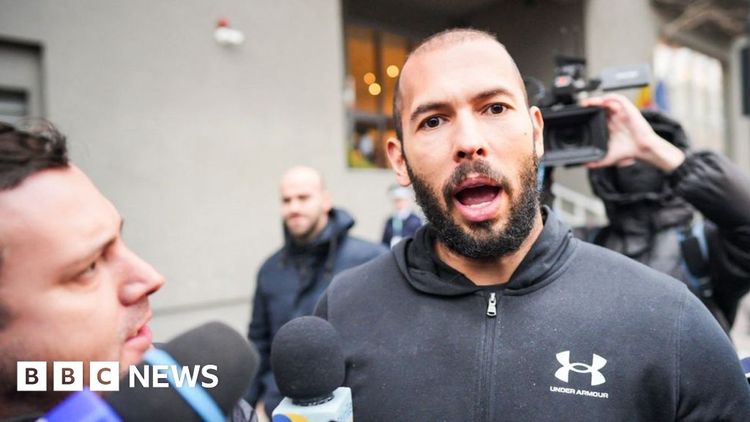Influencers radicalising boys in 'terrifying' way, say police

Police caution that online influencers such as Andrew Tate are influencing boys towards extreme misogyny, which is causing concern.
In a recent statement, senior law enforcement official Maggie Blyth expressed concern that young males could easily be influenced to join extremist groups, much like how terrorists recruit followers.
The National Police Chiefs Council has deemed the problem a "national crisis" in its investigation on violence towards women and girls.
The National Police Chiefs' Council projected that around two million women in England and Wales would experience violence each year, which equates to approximately one in 12 women.
The article mentioned that the issue has been increasing, with a rise in "more intricate forms of illegal behavior".
Deputy Chief Constable Maggie Blyth mentioned that law enforcement officials concentrating on violence against women and girls are now collaborating with counter-terrorism units to assess the likelihood of young men being influenced by radical ideologies.
When discussing dangerous material on the internet, she stated: "We are aware that some of this is connected to the radicalization of young individuals on the internet. We are familiar with influencers like Andrew Tate, who have a significant impact on young boys, which is quite alarming. Both counterterrorism officials and ourselves, focusing on violence against women and girls, are having conversations about this issue."
Mr. Tate is a British-American influencer who has caused a lot of discussion and debate. He calls himself a "misogynist" and became famous after his appearance on Big Brother in 2016.
Right now, he is waiting to go to court in Romania for accusations of rape, human trafficking, and leading a criminal group to exploit women sexually - but he says he didn't do it.
Schools throughout the UK have shared with the BBC that they are noticing a growing number of students who look up to Mr. Tate.
The comprehensive study released on Tuesday by the NPCC and College of Policing found that violence against women and girls has reached alarming levels, comparable to an epidemic.
According to the report, approximately 2.3 million people, which is equivalent to one out of every 20 adults, are responsible for committing acts of violence against women and girls on an annual basis.
Deputy Chief Constable Blyth spoke to BBC Breakfast and emphasized that the true magnitude and consequences of these crimes are not fully grasped by people in various industries and the public.
The study found many serious dangers that victims may face, such as sexual assault, intimate partner violence, harassment, and child sexual exploitation.
A recent study revealed a significant rise of 37% in the amount of violent offenses targeting women and girls from 2018 to 2023.
Authorities report that over one million of these incidents were documented in England and Wales just in the past year, making up 20% of all crimes documented by law enforcement.
According to police leaders, cases of domestic violence are increasing and continue to be a significant challenge for law enforcement.
Some of the increase can be attributed to more crimes being reported and a growing awareness of these offenses.
The NPCC is working on establishing a centralized resource center that will offer assistance to police forces through specialized knowledge and training.
The government is happy to have the hub and hopes to reduce violence against women and girls by 50% in the next ten years.
Yvette Cooper, the Home Secretary, has stated that combating violence against women and girls is a priority for her.
Up until now, there hasn't been much information about the government's plans. However, in their manifesto, Labour mentioned their intention to deploy specialized domestic abuse workers in emergency call centers and establish specialized units for investigating rape in every police force in England and Wales. This aims to ensure that crucial opportunities for preventing and protecting victims are not overlooked.
This would require more qualified police officers and additional resources during a time when law enforcement is dealing with many difficulties, such as retention and morale problems.









































